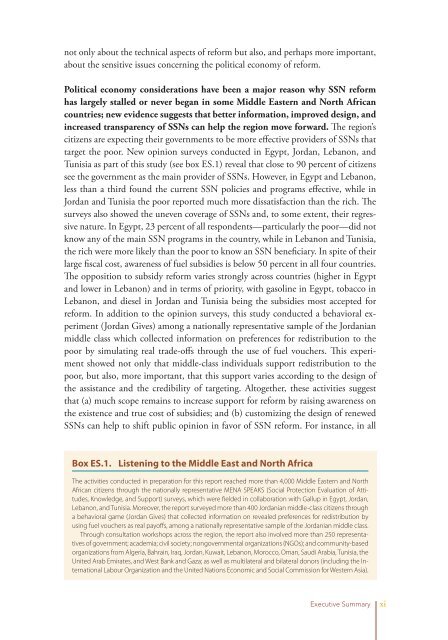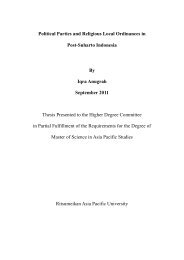You also want an ePaper? Increase the reach of your titles
YUMPU automatically turns print PDFs into web optimized ePapers that Google loves.
not only about the technical aspects of reform but also, <strong>and</strong> perhaps more important,<br />
about the sensitive issues concerning the political economy of reform.<br />
Political economy considerations have been a major reason why SSN reform<br />
has largely stalled or never began in some Middle Eastern <strong>and</strong> North African<br />
countries; new evidence suggests that better information, improved design, <strong>and</strong><br />
increased transparency of SSNs can help the region move forward. The region’s<br />
citizens are expecting their governments to be more effective providers of SSNs that<br />
target the poor. New opinion surveys conducted in Egypt, Jordan, Lebanon, <strong>and</strong><br />
Tunisia as part of this study (see box ES.1) reveal that close to 90 percent of citizens<br />
see the government as the main provider of SSNs. However, in Egypt <strong>and</strong> Lebanon,<br />
less than a third found the current SSN policies <strong>and</strong> programs effective, while in<br />
Jordan <strong>and</strong> Tunisia the poor reported much more dissatisfaction than the rich. The<br />
surveys also showed the uneven coverage of SSNs <strong>and</strong>, to some extent, their regressive<br />
nature. In Egypt, 23 percent of all respondents—particularly the poor—did not<br />
know any of the main SSN programs in the country, while in Lebanon <strong>and</strong> Tunisia,<br />
the rich were more likely than the poor to know an SSN beneficiary. In spite of their<br />
large fiscal cost, awareness of fuel subsidies is below 50 percent in all four countries.<br />
The opposition to subsidy reform varies strongly across countries (higher in Egypt<br />
<strong>and</strong> lower in Lebanon) <strong>and</strong> in terms of priority, with gasoline in Egypt, tobacco in<br />
Lebanon, <strong>and</strong> diesel in Jordan <strong>and</strong> Tunisia being the subsidies most accepted for<br />
reform. In addition to the opinion surveys, this study conducted a behavioral experiment<br />
(Jordan Gives) among a nationally representative sample of the Jordanian<br />
middle class which collected information on preferences for redistribution to the<br />
poor by simulating real trade-offs through the use of fuel vouchers. This experiment<br />
showed not only that middle-class individuals support redistribution to the<br />
poor, but also, more important, that this support varies according to the design of<br />
the assistance <strong>and</strong> the credibility of targeting. Altogether, these activities suggest<br />
that (a) much scope remains to increase support for reform by raising awareness on<br />
the existence <strong>and</strong> true cost of subsidies; <strong>and</strong> (b) customizing the design of renewed<br />
SSNs can help to shift public opinion in favor of SSN reform. For instance, in all<br />
Box ES.1. Listening to the Middle East <strong>and</strong> North Africa<br />
The activities conducted in preparation for this report reached more than 4,000 Middle Eastern <strong>and</strong> North<br />
African citizens through the nationally representative MENA SPEAKS (Social Protection Evaluation of Attitudes,<br />
Knowledge, <strong>and</strong> Support) surveys, which were fielded in collaboration with Gallup in Egypt, Jordan,<br />
Lebanon, <strong>and</strong> Tunisia. Moreover, the report surveyed more than 400 Jordanian middle-class citizens through<br />
a behavioral game (Jordan Gives) that collected information on revealed preferences for redistribution by<br />
using fuel vouchers as real payoffs, among a nationally representative sample of the Jordanian middle class.<br />
Through consultation workshops across the region, the report also involved more than 250 representatives<br />
of government; academia; civil society; nongovernmental organizations (NGOs); <strong>and</strong> community-based<br />
organizations from Algeria, Bahrain, Iraq, Jordan, Kuwait, Lebanon, Morocco, Oman, Saudi Arabia, Tunisia, the<br />
United Arab Emirates, <strong>and</strong> West Bank <strong>and</strong> Gaza; as well as multilateral <strong>and</strong> bilateral donors (including the International<br />
Labour Organization <strong>and</strong> the United Nations Economic <strong>and</strong> Social Commission for Western Asia).<br />
Executive Summary xi



